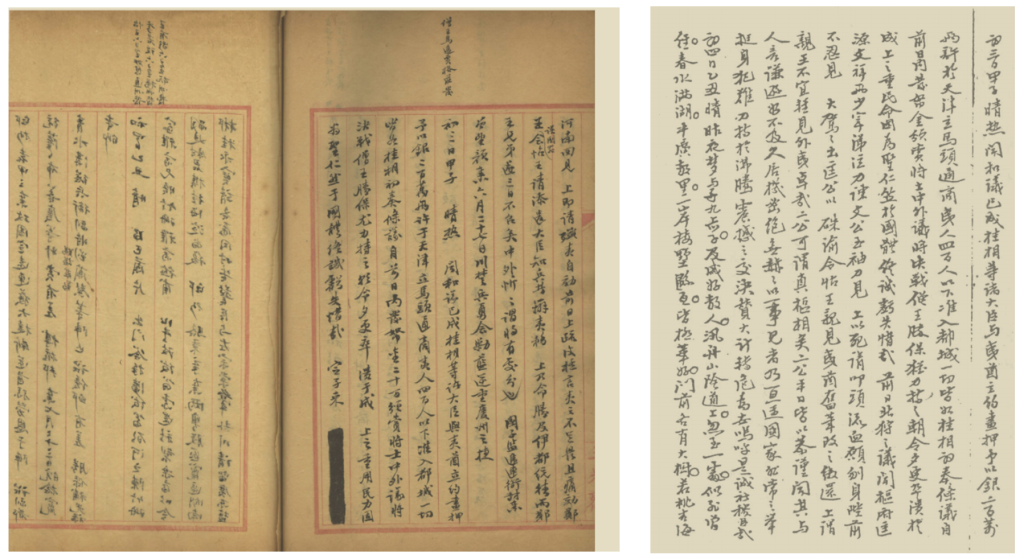
Tranalysis
In the lithographic edition of Li Ciming's diary, on the third day of the eighth lunar month in the tenth year of the Xianfeng era (1860), there is an entry that reads \Dingzi comes.\ The following page is blank, and the content on the page after that is from the official邸抄. Upon examining the original manuscript of Li's diary, it was found that an entire and a half pages were cut off below \Dingzi comes,\ which amounts to three and a half pages, a considerable length. The content that was cut and removed is intriguing.
The Tianjin Library houses a copy of \Yue Man Tang Diary Copy\ transcribed by Sun Yongshang, which continues after \Dingzi comes\: \The previous day's discussion about the northern expedition, it is heard that the two junior ministers of the Central Secretariat, Kuang Yuan and Wenxiang, tearfully and forcefully advised against it. Minister Wen even saw the emperor with a hidden blade in his sleeve, pleading with his life, knocking his head until it bled, willing to be beheaded in front of the imperial presence, unable to bear seeing the emperor's departure. Minister Kuang, with a vermilion edict, ordered Prince Yi to personally see the barbarian chief, and he vigorously changed it, returning it to the emperor, stating that a prince should not casually meet with foreigners. These two ministers are truly remarkable, they can be called true central ministers. Both ministers are known for their respectfulness in their daily lives, speaking with others in a humble manner as if they are not enough, having been in the secret for a long time, there is no grand display of a single matter, yet when encountering the country's extraordinary actions, they stand up against difficulties, holding firm amidst the boiling and shaking, decisively supporting the major plan, turning danger into safety. Alas, they are truly ministers of the state!\ (Sun Yongshang's copy of \Yue Man Tang Diary Copy\) That year, the British and French allied forces invaded China under the guise of revising treaties, stationed in Tianjin, whether to fight or to make peace, there was no consensus among the court and the people, Emperor Xianfeng was indecisive. Li Ciming was staying in the capital at the time due to his donation to the Beijing officials, encountering chaos, and under the shock, he wrote down what he saw and heard every day.
In the fifth year of the Tongzhi era (1866), Li Ciming returned to Shaoxing, where his old friend Sun Tingzhang's son, Xinghua (later renamed Yongchang), came to seek instruction and became his disciple, thus having the opportunity to read his diary and make excerpts. The 150 characters copied by the Sun family are obviously not the entirety of the content cut from one and a half pages, but these 150 characters corroborate that Li's initial intention in writing the diary was not to be \reviewed in advance,\ and to some extent, they also reveal the suspicion of defamation in Li's diary. This record excessively praises the ministers of the state, without any consideration for Emperor Xianfeng's character. In the first month of that year, Xianfeng had just turned thirty, but he no longer possessed any heroic spirit or confidence. The British and French invading forces were bound to enter the capital, and he was unwilling to meet the foreigners, thus unwilling to fight alongside the citizens of the city. When negotiations reached an impasse, naturally, retreating was the best strategy.
Li Ciming highly praised the Grand Councilor Kuang Yuan and Wenxiang for their determination to defend the capital, both of whom were Grand Councilors at the time. Kuang Yuan, a native of Jiaozhou, Shandong, was a Jinshi (successful candidate in the highest imperial examination) in the 20th year of the Daoguang era (1840). Later, he followed the emperor's tour to Rehe and was one of the \Eight Ministers in Charge of the Imperial Will.\ After the \Xinyou Coup,\ he was dismissed from office and returned to his hometown. Wenxiang, a Manchu from the Plain Red Banner, was a Jinshi in the 25th year of the Daoguang era (1845). In the 10th year of the Xianfeng era, he stayed in the capital to assist Prince Yi Xin in negotiating peace with Britain and France and in establishing the Zongli Yamen (Office in charge of foreign affairs), achieving significant political accomplishments. Kuang Yuan boldly revised the imperial edict and firmly refused to let the royal family meet with foreigners, while Wenxiang carried a blade in his sleeve to firmly refuse the northern expedition. Upon hearing of their heroic actions, Li Ciming could not help but commend their resolute spirit. At that time, Senggelinqin stationed troops in Tianjin, building high batteries and declaring war, but in fact, he had no certainty of victory. Before the war, he secretly advised Xianfeng to temporarily leave the capital to avoid the trouble, and at the same time, Gui Liang was ordered to negotiate peace in Tianjin. Emperor Xianfeng made two-handed preparations, on the one hand, encouraging soldiers and comforting the people, and on the other hand, secretly preparing vehicles and planning the northern expedition itinerary. Li Ciming's high evaluation of Kuang and Wen represented the broad public opinion—that the emperor should not abandon the city and leave. However, in the early morning of the eighth day of the eighth lunar month, Emperor Xianfeng left the capital through the back door of the Old Summer Palace.
Weng Tonghe's diary also records Wenxiang's strong advice to Emperor Xianfeng to defend the city. On the first day of the eighth month, he wrote: \The previous day's decree was due to Prince Chun's bitter tears and strong argument, requesting to lead the troops in a decisive battle, and Prince Dun also spoke up. Wenxiang, a member of the military machine, argued even more strongly, hence the virtuous decree.\ (Weng Tonghe \Weng Tonghe's Diary\) Weng Tonghe's father, Weng Xinxin, had a significant disagreement with Su Shun over the Five-Character Note Case and took sick leave as a Grand Scholar of the Ti Ren Pavilion, so the palace secrets he obtained should be more reliable than those of Li Ciming, who had just entered the capital to donate an official position. Li Ciming only wrote about Wenxiang's strong argument on the third day of the eighth month, obviously lagging behind Weng Tonghe, but he mentioned \His Majesty\ twice, while Weng was very cautious and did not mention Emperor Xianfeng at all. He copied the imperial edicts for several days before and after, but only as a record of the facts.

The rumor of the dispute between Li Ciming and his sovereign might have been inside information brought by \Dingzi.\ Lv Yaodou, styled Tingzhi, and also known as Dingzi, was from Yanghu, Jiangsu. He became a Jinshi (imperial scholar) in the 30th year of the Daoguang Emperor (1850), and served as an editor in the Hanlin Academy for many years without promotion. He was cut off from family correspondence, with the fate of his family unknown, which caused him great anxiety. On March 13th of the Xianfeng Emperor's tenth year, Li Ciming wrote: \Gazing towards the southern clouds, my spirit and soul are lost. On this day, the spring light was just beautiful, with the charm of oriole songs and green grass, yet I felt the wind and sun were bleak and gloomy, almost as if not of this world, sitting alone muttering, with irregular sleep and wakefulness. The few beams of my home near the city, I fear, no longer exist. My old mother and weak children, I do not know where they have hidden.\ Lv Yaodou, sympathizing with his plight, picked up his pen and annotated: \Reading these few lines, my heart is filled with sorrow. Yaodou with tears in his ink.\ (Li Ciming's \Yue Man Tang Diary\) Two days later, Lv Yaodou received the tragic news that after Changzhou city fell, his siblings all died in the disaster, and Li Ciming immediately wrote a letter to comfort him. At that time, Lv Yaodou was an editor in the Hanlin Academy, and his news was more timely and reliable; he kept bringing the latest developments. On June 30th, Lu visited Li Ciming and informed him that Dagu was besieged, and then successively came to report the battle situation between Senggelinqin and the British and French invading forces in Tianjin.
On July 25th, Li Ciming heard the rumor that Xianfeng had ordered the preparation of the six armies, using the excuse of a personal campaign but actually making travel plans. He hoped that the emperor would cancel this adventurous journey, \Not only will the imperial carriage cause panic in the capital, but also there is a risk of hidden dangers along the way and the collapse of the guards in the middle of the journey. The spirits of our ancestors should warn against this trip.\ (Li Ciming's \Yue Man Tang Diary\) However, the next day, three hundred carriages were already prepared in the palace. On the 27th, Pan Zuye and others from the Southern Study and the Upper Study, along with officials from the six ministries and nine temples, the Censorate, and the five-city inspectors, submitted a joint memorial to stop the carriage, all of which were kept in the palace without being issued. On the other hand, Emperor Xianfeng actively issued a red edict to refute the rumors, claiming that the carriages were indeed prepared for the personal campaign. Li Ciming and Weng Tonghe both copied this imperial edict: \Recently, due to the urgency of military affairs, there is a need for carriages and horses, and they have been mobilized one after another, which inevitably leads to complaints. I have heard that there are rumors outside, even saying that I will visit Mulan for a fall hunt, causing people to be confused and spread the news. As the master of the world's people, in such a difficult situation, how can I have the leisure to travel and inspect? And if there were such an action, it would certainly be clearly decreed and announced in advance, and there would never be a case where the imperial carriage arrived without the world knowing. You, the officials and people inside and outside the country, should be able to understand this together. All the carriages and horses prepared for the military camp should be returned immediately by the imperial decree, and should not be detained and waited for, in order to quell the rumors and stabilize people's hearts.\ At this time, Li Ciming still naively believed, \This trip was not originally intended by the emperor, with no retreat and clear pros and cons.\ (Li Ciming's \Yue Man Tang Diary\)
This \voice of virtue\ that stabilized people's hearts, Mr. Mao Haijian speculates, was likely drafted by Wenxiang. By refuting rumors, it \used Emperor Xianfeng's mouth to tie Emperor Xianfeng's legs\ (Mao Haijian, \The Unfortunate Emperor\ On the third day of the eighth month, the Grand Secretary Gui Liang and others went to Tianjin to negotiate with the British and French, and the preliminary success was achieved, acknowledging the \Tianjin Treaty,\ paying an additional two million taels of silver, opening Tianjin as a port, and allowing up to four hundred foreigners to enter the capital. Scholars in the court and the country believed that this move was a loss of national dignity, but the emperor could thus not abandon the people, which was also a misfortune in a fortunate way. Therefore, on this day, Li Ciming praised Kuang Yuan and Wenxiang for their death remonstration, and also believed that the emperor would stand with the capital, and the world could \turn danger into safety.\
However, on the fifth day of the eighth lunar month, a change occurred in the negotiations. Harry Parkes wanted to enter the capital to meet Emperor Xianfeng and personally deliver the national letter. Prince Yi Zaiyuan told him about the court etiquette and the system of crown and clothing that he should follow. Parkes did not accept the change of clothes and the kneeling and bowing ceremony, so the Prince reported to Senggelinqin, \The peace cannot be achieved, and we should fight immediately.\ On the seventh day, Shengbao was defeated in Tongzhou, fell off his horse and was transported to the capital by cart. At that time, various theaters were performing plays, and when they saw this situation, they scattered in a panic, and the city gates were closed, creating an unprecedented tense atmosphere. Since the peace talks failed, there was only one battle, so Emperor Xianfeng once again considered the plan to go north. After breakfast on the eighth day, \the carriage went out to the east, and the palace family hurriedly left, causing a great shock to the people\ (Li Ciming's \Yue Mantang Diary\ Pan Zengshou recorded, \The holy chariot left at noon to patrol and visit Mulan\ (Pan Zengshou's \Pan Zengshou Diary\ Weng Tonghe's diary wrote: \I heard that the holy chariot went out to patrol, and some court officials (Rui Chang) argued on the ground, and they were driven out. The six palaces went first, Su Shun followed, and Prince Hui and others all accompanied the chariot. Chen Ziku, the Grand Minister of Justice, invited my brothers to the group defense office to discuss matters, and I refused.\ (Weng Tonghe's \Weng Tonghe Diary\)
On the evening of the seventh and the morning of the eighth, Li Ciming's cousin Chen Shouqi was waiting for an audience at the Old Summer Palace. Chen Shouqi had ranked eighth in the military machine examination and was scheduled to be presented on the eighth. On the evening of the seventh, he entered the garden and noticed that the eunuchs were searching for carriages everywhere, surrounding them with yellow curtains, and by nightfall, the palace relatives had already left the city. He waited until the next morning, only to be informed that the audience was canceled, and had to hastily leave the garden amidst the chaos, informing Li Ciming that Emperor Xianfeng, accompanied by Su Shun and others, left through the back door of the Old Summer Palace during the Si Ke (from nine to eleven in the morning).
Four hours later, the officials and scholars of the inner city took their families to the suburbs to avoid the soldiers, and dry food such as baked wheat cakes and steamed buns were snatched up along the way. Weng Tonghe took his family to Fangshan, \In the afternoon, I accompanied my mother to Lv Village for a short stay to avoid it,\ Weng Zeng Yuan took his mother to Miyun, Weng Zengchou took his wife and children to Changping, and Weng Tonghe's father-in-law Tang Jinzhao moved to Baoding. The whole family had to be split up in order to ensure their safety, and those avoiding the soldiers were as dense as a weave on the road. (Weng Tonghe's \Diary of Weng Tonghe\) Zhu Xueqin went to Fangshan, Xu Naipu went to Zhuozhou, Pan Zengying went to the Western Hills, Pan Zengshou arrived at Jie Tai Temple on the tenth day, on the fourteenth day at the Western Suburb's Mentougou Tanzhe Temple, and Pan Zengwei stayed in Xiong County. (Pan Zengshou's \Diary of Pan Zengshou\) On this day, Lv Yao Dou brought his friend Jiang to visit Li Ciming, and in the evening, Li Ciming wrote another letter to the Lv family, saying that prices had soared several times, and there was no trade in the market. The capital was shrouded in a cloud of terror. Scholars in the capital, such as Gao Xinkui, Wang Kaiyun, and Mo Youzhi, quickly left the capital.
Li Ciming, along with his fellow townsmen and officials Zhou Xingyu and Chen Shouqi who rented houses on Shunzhi Gate Street, as well as newly acquainted individuals such as Lv Yaodong and the nephews of Chen Fu'en, could neither return to their hometowns nor afford to escape to the suburbs to avoid the soldiers. They had no choice but to calmly share the fate of the city. During the fire at the Old Summer Palace, he witnessed it firsthand, and on the 23rd of August in the tenth year of the Xianfeng era, his diary recorded in double lines: \That night, the people in the city were terrified by the firelight, and many officials changed their clothes and led their families to flee in all directions, continuing until dawn, with cries of distress heard far and wide.\ However, there is also a smudge under this sentence. According to Sun Yongshang's copied version of \Yue Man Tang Diary Copy,\ it is known that Li's original manuscript stated: \The family members of a certain prime minister walked through the streets. My cousin and I closed the door and slept soundly, utterly indifferent.\

Who exactly is referred to as \a certain prime minister\? Generally speaking, a prime minister must hold the title of a Grand Secretary of the Cabinet, which is known as entering the cabinet to become a prime minister. So, who were the ministers who served as prime ministers in the tenth year of the Xianfeng era?
On August 24, 1860, in the afternoon of the tenth year of the Xianfeng era, the British and French invading forces burned down the Old Summer Palace. \For several days, people in the capital have been fleeing in a hurry, with many court officials leaving with their entire households, including the two former assistants from Changshu (Weng Xinxin) and Shouyang (Qi Juanzao). Today, even more people are leaving the city, with carriages and horses coming and going, leaving the markets empty. Those who fled from Haidian to the city were carrying the elderly and children, a continuous stream on the roads. Some high-ranking officials who had previously taken refuge in Haidian, upon hearing the sudden arrival of foreigners last night, abandoned their families and possessions and fled. The imperial censor Shen Zhaolin lost his way during the night and, after running for more than a hundred miles, finally entered the city in a disheveled state. The homes of soldiers and civilians that were burned down left them scattered and crying, their wails shaking the suburbs. With tens of thousands of foreign invaders deeply penetrating and causing such a tragic change under the imperial carriage, it is a cause for deep sorrow.\ (Li Ciming, \Yue Man Tang Diary\) On that day, Weng Tonghe passed through Haidian, \encountering refugees, the elderly and women, a continuous stream.\ (Weng Tonghe, \Weng Tonghe Diary\) Weng Tongjue and other staff members were at the Dongguan of the Baoding Zhongzhou Guild Hall, \since yesterday afternoon, smoke and flames from the northwest have obscured the sky. The scouts returned, saying that the garden was still intact, but the furnishings had already been looted by bandits. Many houses in the southern part of Haidian have also been burned down, with refugees continuously on the road. Prince Gong and others have already arrived at Changxindian.\ (Weng Tongjue, \Weng Tongjue Diary\)
A native of Jinhua, Zhejiang, who experienced the city's defense, Hu Fengdan, reminisced about the chaos in the capital during the Xianfeng decade (1860) in August, writing: \In the year of Gengshen, foreign troops approached the capital, and the princes and ministers in charge, including Minister Jia, requested that twenty officials from the Ministry of Revenue, Ministry of War, and Ministry of Justice be brought along. On the Mid-Autumn Day, the Yuan Garden was set on fire, and only Weng Yushuai, Chen Qiufan, Chen Dishan, and I, four people, were in the office, while the rest took their families and left the city.\ In the note to his \Gratitude Records,\ he wrote: \In the eighth month of Gengshen, the capital was on high alert, Zhou Zhitai and Jia Juntu, two princes and ministers, Chen Zihe and Zhao Rongfan, two ministers, went out to the outer city to station troops, bringing sixteen officials from the ministry, and Fengdan was among them.\ (From Hu Fengjin's \Tui Bu Zhai Shi Wen Cun\ in \Xin Si Mu Chun Birthday Self-Indictment\) Weng Yushuai is Weng Tongjue, who wrote in his diary on the eleventh day of the eighth month of the Xianfeng decade: \Upon arriving at the office, I learned that Minister Jia had assigned me and Fu Chen to be attendants at the outer city office, and in the evening, I arrived at Baiyi Temple, where Jia, Zhou, Chen, and Zhao, four halls, arrived one after another.\ (From Weng Tongjue's \Weng Tongjue's Diary\) Weng Tongjue and Hu Fengdan were the attendant officials of \Jia, Zhou, Chen, and Zhao,\ Chen Fu'en served as the Minister of Revenue, and Zhao Guang was in charge of the Ministry of War, neither of them held the title of Grand Secretary, and Li Ciming's reference to the \certain prince and minister\ in the inner city is very likely the \Zhou Zhitai and Jia Juntu, two princes and ministers\ recorded by Hu Fengdan. Zhou Zuppei, a native of Shangcheng, Henan, was a successful candidate in the 24th year of the Jiaqing era (1819), and at that time, he was the Minister of Revenue and a Grand Secretary of the Ti Ren Pavilion, serving as an official in charge of affairs in the capital; Jia Zhen, a native of Huangxian, Shandong, was the second place in the imperial examination in the sixth year of the Daoguang era (1826), and at that time, he was the Minister of Personnel, serving as a Grand Secretary of the Ti Ren Pavilion and in charge of defense affairs. The two were the actual holders of the prime minister's real power in the tenth year of the Xianfeng era, and \certain prince and minister\ should refer to these two people.
In August of the tenth year of the Xianfeng era (1860), Li Ciming, in his humble abode on Shunzhi Gate Street, commemorated the moral monument constructed by Wenxiang and Kuangyuan, which was obscured by the hasty dust of the Forbidden City's northern retreat. Fortunately, the fragments copied by Sun Yongshang still faintly reveal the choices of emperors and generals during the invasion of the British and French forces and their historical tension. After the \Xin Chou coup\ in the eleventh year of the Xianfeng era (1861), Empress Dowager Cixi ascended to the political stage, and ministers compiled the \Zhiping Baojian\ to lecture her on the principles of governing the country, but her governance experience might still have originated from her husband, Emperor Xianfeng. In the twenty-sixth year of the Guangxu era, the Gengzi year (1900), during the invasion of China by the Eight-Nation Alliance, Empress Dowager Cixi and Emperor Guangxu retreated to the west, which, although separated by forty years and five \Geng\ cycles (Geng Shen, Geng Wu, Geng Chen, Geng Yin, Geng Zi) from Emperor Xianfeng's northern retreat in the Geng Shen year of the tenth year of the Xianfeng era (1860), their strategies in dealing with foreign enemies were identical, truly embodying the phrase \learning from history as a mirror.\




